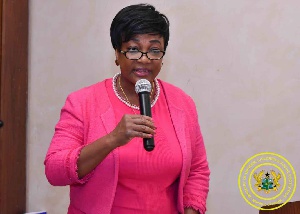 Executive Director of the Henry Djaba Memorial Foundation, Dr. Otiko Afisah Djaba
Executive Director of the Henry Djaba Memorial Foundation, Dr. Otiko Afisah Djaba
As Ghana’s COVID-19 active cases begin to surge again after a few months of taking a nosedive, the Henry Djaba Memorial Foundation, an NGO based in Accra has embarked on series of Community Sensitization Durbars to increase awareness and knowledge on the global pandemic for women, girls, persons with disabilities and other identifiable groups at Somanya in the Yilo Krobo District of the Eastern Region.
Other identifiable groups included market men and women, hairdressers, dressmakers, drivers, school children, artisans, beads makers and religious groups among others.
The programme according to the Executive Director of the Henry Djaba Memorial Foundation, Dr. Otiko Afisah Djaba is to ensure that those target groups are able to manage and control the pandemic and also live a safe and healthy life.
The sensitization programme which was done in collaboration with Global Affairs Canada through Plan International Ghana Women’s Voice and Leadership programme is being funded by the Canada Fund (Government of Canada).
She noted that the programme is intended to ensure that stakeholders at the local level are brought together to brainstorm further on how to win the fight against the COVID-19 pandemic.
According to the former Minister for Gender, Children and Social Protection, it is also aimed at making sure that duty bearers and health professionals address the [social, economic and health] needs the vulnerable groups especially women, girls and persons with disability in order to avoid the spread of the pandemic.
The first day of the three days’ programme saw the sensitization of duty bearers, traditional rulers, religious leaders, heads of institutions and assembly members.
The second day will be for the training of women, girls, persons with disability and other identifiable groups on their rights, roles and responsibilities in terms of COVID-19 prevention, and the third day will be for the airing of the “Let’s Talk Ability” TV show so that the lessons learnt and information shared during the sensitization trainings in Somanya can be disseminated to people across the 16 regions of Ghana.
The Executive Director of the Henry Djaba Memorial Foundation passionately appealed to the Government to support persons with disability and vulnerable women and girls to prevent them from engaging in activities that would expose them to the pandemic.
Dr. Otiko Afisah Djaba warned the public against the indiscriminate open spitting, sneezing and vomiting which she said, could easily expose persons with disabilities and children who crawl or walk on their buttocks or with their bare hands to contract the disease.
A Programme Officer at the Henry Djaba Memorial Foundation, Mr. James M. Sambian took the participants through several topics such as: breaking the ignorance, myths and misconceptions on COVID-19; behaviour and attitude change to encourage compliance with CoVID-19 safety protocols; and healthy lifestyle and information sharing among others.
Mrs. Patricia Essel from Plan International called on all stakeholders especially traditional and religious leaders to complement the efforts of the Government and Civil Society Organisations such as the Henry Djaba Memorial Foundation in the fight against the global pandemic.
The Konor of Yilo Krobo Traditional Area, who was represented by his Secretary, Lovelace Emmanuel Okonkor commended Dr. Otiko Afisah Djaba and her Foundation for showing special interest in developing and empowering the people of the area.
He assured his personal commitment to complement the efforts of the Government and the NGO to ensure that COVID-19 is defeated from Ghana.
The Henry Djaba Memorial Foundation did not only make the sensitization programme very interactive for experience and information sharing but also provided useful learning materials on COVID-19 prevention to guide the participants even in their homes and at workplaces.